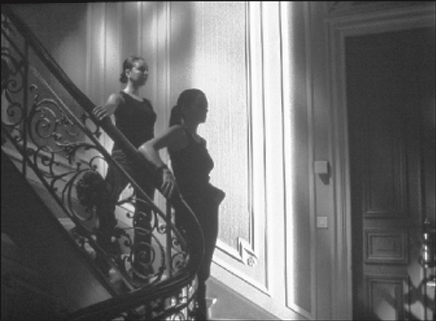By Steven Snyder
A sexually-charged, eyebrow-raising film that often straddles the fine line between erotic thriller and all-out pornography, “Exterminating Angels” achieves in many ways what Stanley Kubrick set out to do, but only partially realized with his final film “Eyes Wide Shut.”
In both works, men cast caution to the wind and take the plunge into a world of sexual fantasy, exploring their deepest and darkest temptations. Ultimately the difference between the two films hinges on Jean-Claude Brisseau’s ability to push the conversation to an extreme beyond Kubrick’s wildest imagination. As many may remember, Kubrick’s original version of “Eyes Wide Shut” was deemed too extreme for mainstream audiences, and became a rallying cry for such critics as Roger Ebert in excoriating the current ratings system and demanding the creation of a functional adults-only rating that could operate free of the stigma attached to NC-17 projects.
No doubt if there was such a rating, “Exterminating Angels” would fall under it. The nudity here is pervasive, the sexuality heightened and unfiltered, and many scenes will silence entire audiences in astonishment. At once a study in sexuality and a critique of the way we regard it, it is one of the most provocative works since 2002’s “Secret Things” — which happens to be another Brisseau film.
“Angels’” story is seen through the eyes — or is it the lens? — of Francois (Frederic van den Driessche), a film director who one day finds himself intrigued by an actress’ steamy sex scene audition. For him, it’s a standard affair at first — subjecting a potential actor to a film’s most challenging scenes — but when the auditioner informs him that she did not fake her orgasm, growing instead more aroused by his presence and his watching, Francois scraps his initial idea and decides to create a work about the nature of fetishes and transgressions.
So he sets out to recruit more uninhibited actresses, this time asking them not to audition for a more serious film but instead to sign on for a project fixated solely on sex. As one woman after another refuses, Francois comes close to giving up on the project before meeting three actresses eager for his challenge — the mysterious Stephanie (Marie Allan), the unstable Charlotte (Maroussia Dubreuil) and the stunningly beautiful Julie (Lise Bellynck). Brought together in pairs and then as a trio, at times at public restaurants and at others in exposed hotel hallways within earshot of guests next door, their encounters grow more surreal and steamy as Francois brainstorms new and riskier scenarios.
Naturally, he is interested in how these public spaces and the relative anonymity of their partners affects each women’s sexual encounters. But something far more fascinating is playing out in the relationship between these women and Francois himself, who never participates but is always acutely present. He watches in fascination, at times the observer, the seducer and the instructor, and then returns home to make passionate love to his wife, who warns him that he’s getting too close.
Yet the more intense these sessions become, the more intricate his position — and through him, the audience’s — becomes. He, like us, is the watcher, but his watching is not removed from the experience. His seeing changes everything for these women, and as he begins to have ethereal conversations with a pair of fallen angels sent down to watch him, their watching and critique of Francois as he watches his subjects takes things to a new level altogether.
So ultimately it’s a movie about perspective. Where one person sees the beauty of the female form, another sees the tantalizing nature of taboos and the titillating prospect of the voyeur. From the women to the angels to Francois, these sexual experiments are constantly being reframed and reexamined. And what’s most fascinating about “Exterminating Angels” is watching Brisseau peel away these layers, one by one, revealing how these sordid escapades say less about the women participating than the man who has brought them together.
When all is said and done, Brisseau’s film may ultimately be less about the steamy story on the screen than about the collective way those images are received, and perceived, by the rest of us.
It’s provocative and unsettling — the kind of thing Kubrick would have dug.

































